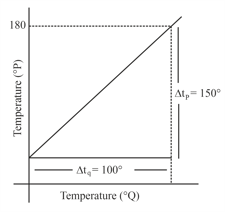HARD
Earn 100
Describe the Celsius scale, Fahrenheit scale and Kelvin scale in detail. Give the temperature conversion relations among the different temperature scales.
Important Questions on Thermal Properties of Matter
HARD
A certain liquid has a melting point of and a boiling point of . A thermometer is designed with this liquid and its melting and boiling points are designated at and . The melting and boiling points of water on this scale are
EASY
The graph between two temperature scales and is shown in the figure. Between upper fixed point and lower fixed point there are equal divisions of scale and divisions on scale . The relationship for conversion between the two scales is given by :
 .
.
EASY
Convert into Celsius.
EASY
At what temperature do the Fahrenheit and Celcius scales of temperature coincide?
EASY
The temperature of an object is Its value in Fahrenheit scale is
EASY
The normal body temperature of humans is about _____ .
EASY
Temperature of boiling water cannot be measured by a _____ (clinical/laboratory) thermometer.
EASY
A _____ thermometer is used to measure our body temperature.
EASY
_____ (Clinical / Digital) thermometer contains mercury.
EASY
The lower fixed point is _____ in a clinical thermometer.
EASY
The liquid present in a clinical thermometer is _____.
EASY
The thermometer that measures our body temperature is called _____.
EASY
The thermometer whose range is to is _____ thermometer. (clinical / laboratory).
EASY
The average human body temperature is _____.
EASY
A clinical thermometer can measure temperatures between to _____.
EASY
While taking the temperature of a liquid kept in a container, the bulb of the thermometer _____ (should/ should not) touch the wall of the container.
EASY
Temperature of boiling water cannot be measured by a _____ (laboratory / clinical) thermometer.
EASY
A _____ thermometer is used to record body temperature.
EASY
_____ is present in clinical thermometer to prevent the backflow of mercury.
EASY
The temperature of healthy human body is _____ .

